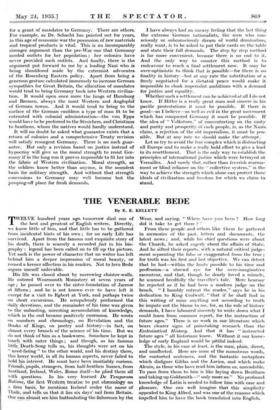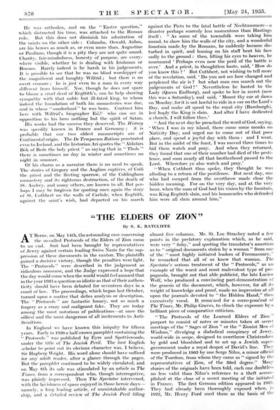THE VENERABLE BEDE By E. E. KELLETT TWELVE hundred years
ago, tomorrow -died one of J the best and greatest of English writers. Directly, we know little of him, and that little has to be-gathered from incidental hints of his own ; for no early Life has survived. Apart from the famous and exquisite story of his death, there is scarcely a recorded fact in his bio- graphy :. legend has been called on to fill up the picture. Yet such is the power of character that no writer has left behind him a deeper impression of moral- beauty, or roused a keener affection in his readers. Not to love Bede argues 'oneself nnlovable.
His life was closed about by narrowing cloister-walls. He entered Wearmouth Monastery at seven years of age ; be passed over to the sister-foundation of Jarrow at fifteen.; . and he is not known ever to have left it except for .a visit to Egbert at York, and perhaps twice on short, excursions. He scrupulously performed the daily devotions, and the remainder of his time was given to the unhasting, unresting accumulation of knowledge, which in the end became positively enormous. He wrote on numbers and chronology, on Revelation. and the Books of Kings, on poetry and history-4n fact, on almost, every branch of the science, of his time. But we do not think of him as a bookworm. Somehow he kept in touch,. with outer things ; and though, as his famous little Death:Song tells us, his thoughts were set on his " oeC:d-Earing to the other. world, and his destiny there, tliis lower,world, in all its human aspects, never failed to holdhis,interest. He must have been insatiably curious. Friends, pupils, strangers, from half-heathen Sussex, from Scotland, Ireland, Wales, Rome itselfHhe plied them all with questions. In his . very learned Pe Ternporunt Ratione, the first Western treatise to put chronology on a firm basis, he ;mentions Iceland under the name of Thule, and tells us, that it lies six days'• sail from Britain.. One can alMost see-him buttonholing the.fishermen by the Wear, and- saying, " Where have you been ? How long did it take to get there ? "
From these people and others like them he gathered in memories of the past, letters and documents, the latest news ; and,- while his chief questions were aboht the Church, he asked eagerly about the affairs 'of State. And he sifted their reports, with a natural critical judge ment separating the false or exaggerated from the true for truth was his first and last objective. We can detect that he had—within the limits possible to his time- and profession—a shrewd eye for . the over-imaginative raconteur, and that, though he dearly loved a miracle, he scanned heedfully the traveller's tale. Mete hearsay he rejected as if he had been a modern judge on the bench. " I humbly entreat the reader," says he in his dedication to King Ceolivulf, "that if he shall find' in this writing of mine anything not according to truth he impute not the 'blame to me, for, as the rule of history' demands, -I-have laboured sincerely to write down what I could learn- from common report, for the instruction of future ages." There is no work in our literature which bears clearer signs of painstaking research than the Ecclesiastical History. And that it has' " instructed future ages" all historians know. Without it our know- ledge of early England would be pitiful indeed.
The style, in his case at least, is the man, plain, 'direct, and unaffected. Here are none of the monstrous words, the contorted sentences, and the fantastic metaphors which disfigure Gildas and the Lorica, and which make Akuin, as those whohave read him inform us, unreadable. To pass from them-to him is like laying down Bentham, and taking up Goldsmith—" only more so." No profound knowledge of Latin is needed to follow him with ease and pleasure. One can well imagine that this simplicity- appealed-to King Alfred, and was one of the reasons which impelled him to have the book translated into English. He was orthodox, and on the " Easter question," which distracted his time, was attached to the Roman rule. But this does not diminish his admiration of the saints on the other side : Columba, Oswald, Aidan, are his heroes as much as, or even more than,- Augustine or Pennons, though it is a pity they are not quite sound. Charity, fair-mindedness, honesty of purpose, arc every- where visible, whether he is dealing with Irishman or Roman. Rarely indeed is he harsh in his judgements. It is possible to see that he was no blind worshipper of the magnificent and haughty Wilfrid ; but there is no overt censure ; he is just even to a man in every way different from himself. Nor, though he does not spare to blame a cruel deed of Ecgfrith's, can he help showing- sympathy with that noble but ill-fated king, to whom indeed the foundation of both his monasteries was due, and in whose " sundorland " he was born. Contrast him here with Wilfrid's biographer Edz.)L who can see in opposition to his hero nothing but the spirit of Satan.
His works had the success they deserved. The History was speedily known in France and Germany ; it is probable that our two oldest manuscripts are of Continental origin. The De Temporum Hallow penetrated even to Iceland, and the historian Ari quotes the " Aldafars Bok of Bede the holy priest " as saying that in " Thule " there is sometimes no day in winter and sometimes no night in. summer.
Of his charm as a narrator there is no need to speak. The stories of Gregory and the Anglian captives, of Coifi the priest and the fleeting sparrow, of the Coldingham monastery and its righteous destruction, of the death of St. Audrey, and many others, are known to all. But per- haps I may be forgiven for quoting once again the story of St. Cuthbert on the walls of Carlisle, when Ecgfrith, against the saint's wish, had departed on his march against the Picts to the fatal battle of Nechtansmerc—a disaster perhaps scarcely less momentous than Hastings itself : " As some of the townsfolk were taking him round, to show him the-walls of the city, and a wonderful fountain made.by the Romans, he suddenly became dia:- turbed in spirit, and - leaning on his staff bent his face sadly to the ground : then, lifting his eyes to .heaven, he murmured ! Perhaps even now the peril of the battle is over.' And a priest, in thoughtless haste, said, ' How do you know this ? ' But Cuthbert, not wishing to tell more of the revelation, said, ' Do you not see how changed and perplexed the air is ? but what man can search out the judgements of God ? Nevertheless • he hasted to the Lady (Queen Eadburg), and spoke to her in- secret (now this was a Saturday), and said, ' Mount thy car at dawn on Monday, for it is not lawful to ride in a car on the Lord's Day, and make all speed to the royal city (Bamburgh), lest haply the King is slain. And after I have dedicated a church, I will follow thee.'
" And the next day he preached the word of God, saying, ' When I was in my island, there came some monks on Nativity Day, and urged me to come out of that poor place, and spend a joyful day with them : and I went. But in the midst of the feast, I was moved three times to bid them watch and pray. And when they returned, they found that one of their number had died of the pesti- lence, and soon nearly all that brotherhood passed to the Lord. Wherefore ye also watch and pray.'
" When Cuthbert thus spoke, they thought he was alluding to a return of the pestilence. But next day, one who had escaped from the overthrow made clear the hidden meaning. For on the very day, and at the very hour, when the man of God had his vision by the fountain, was King Ecgfrith slain, and his housecarles who defended him were all slain around him."















































 Previous page
Previous page